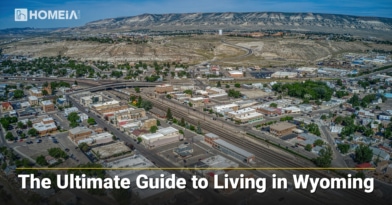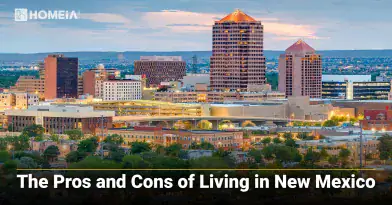7 Key Factors to Know About Living in Denver, Colorado
- Local Editor:Local Editor: Christina Leone
Published: Oct 22, 2024
- Category: City Living Guide
Denver is a city of contrast, where rapid growth meets deep-rooted history. With more than 716,000 people calling it home in 2023, the city has grown by 19% over the last decade, drawing in professionals, families, and adventurers alike. From modern high-rises to historic neighborhoods, Denver offers a variety of lifestyles. It’s a city shaped by innovation, and its position as a gateway to the Rockies gives it an undeniable allure for those interested in living in Denver.
This growth has brought many benefits to the city, including a thriving job market and an influx of new cultural and recreational opportunities. Denver has become a destination for those seeking both career advancement and an active lifestyle, offering the perfect mix of professional opportunity and outdoor access. Whether you’re relocating for work, adventure, or a change of pace, the city’s combination of urban amenities and proximity to nature makes it an attractive place to call home.
However, Denver’s growth comes with challenges. As the population rises, housing prices follow suit, and the living costs require careful planning. But for many, the rewards far outweigh the obstacles. With its mix of career prospects, cultural engagement, and natural beauty, Denver remains high on the list of places to live.
Before making Denver your home, consider these key factors. Whether navigating the housing market, adjusting to the cost of living, or finding your place in a rapidly evolving city, understanding Denver’s unique dynamics will help you make the most of what it offers.
Table of Contents:
- HOMEiA Score: Our Methodology
- 1. Lifestyle of Denver: Urban Convenience with Outdoor Adventure
- 2. Cost of Living: Navigating Expenses Among Rising Popularity
- 3. Denver Housing Market: Opportunities in a Rising Market
- 4. Safety and Healthcare: Living Well in a City Focused on Well-Being
- 5. Employment in Denver: Career Growth in a Booming Economy
- 6. Education: Shaping the Future
- 7. Climate in Denver: Sunshine, Snowfall, and Mile-High Skies
- Summing it Up with Something for Everyone
- FAQs about Living in Denver, Colorado
HOMEiA Score: Our Methodology
Our Methodologies to create HOMEiA Score Ratings for Each Group of Content
HOMEiA uses a consistent, data-driven methodology to evaluate U.S. states for livability, affordability, and long-term value. Our analysis centers on key factors such as Housing and Affordability, Cost of Daily Living, Access and Infrastructure, Community Strength, Safety and Quality of Life, Economic Resilience and Job Market…
1. Lifestyle of Denver: Urban Convenience with Outdoor Adventure
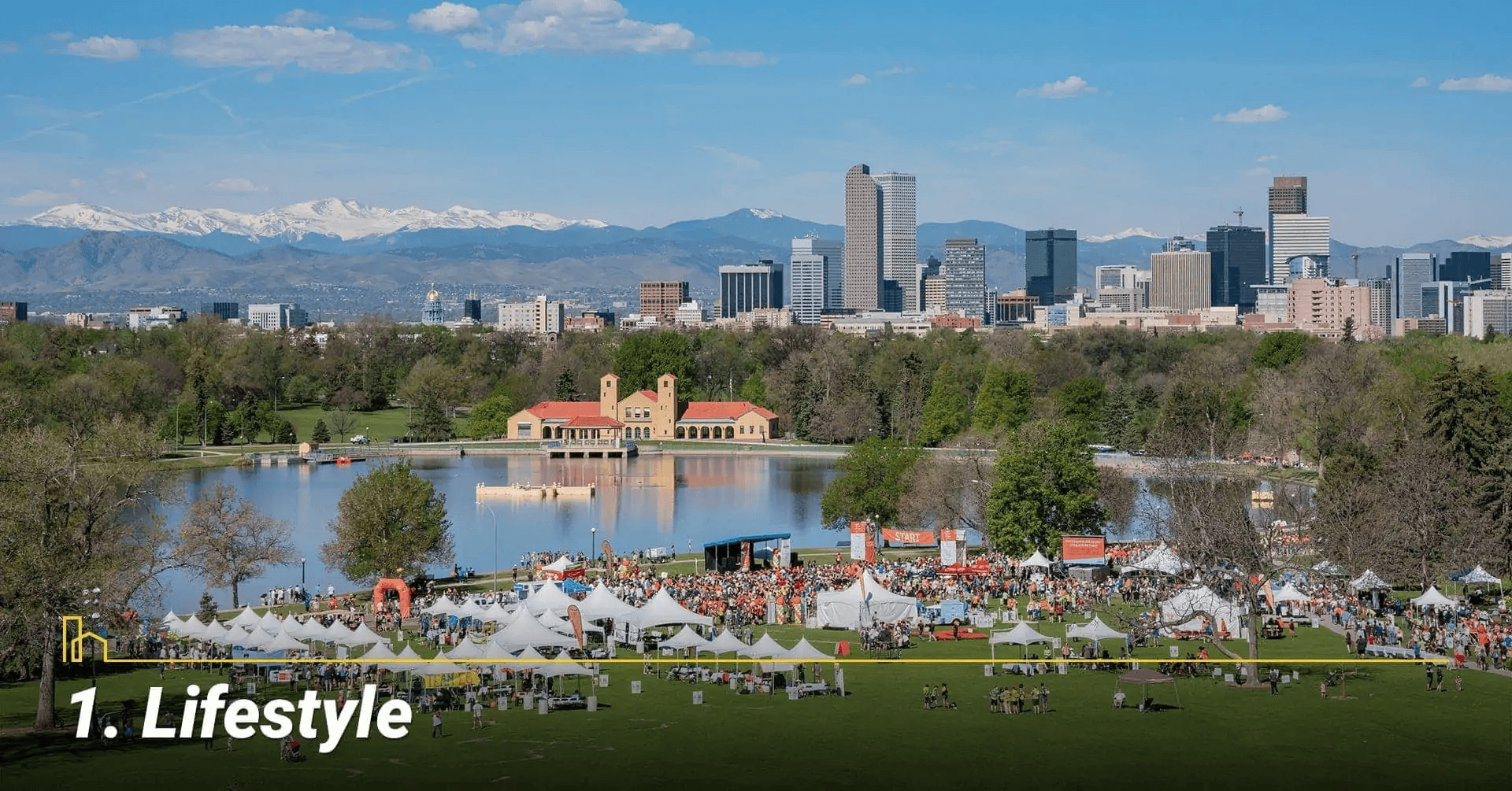
Denver embraces local culture, with residents passionately supporting small businesses, neighborhood parks, and craft breweries. The city’s historic architecture, particularly in Capitol Hill, contrasts with modern downtown developments, creating a unique living experience that honors tradition while looking toward the future.
Culturally, Denver has no shortage of experiences to explore. Art is a central part of the city’s identity, with the Denver Art Museum housing collections that span Indigenous art to modern pieces and public art installations, adding creativity to everyday streetscapes. The Denver Performing Arts Complex hosts a range of performances, from Broadway tours to local theater productions, giving residents ample opportunities to enjoy live entertainment.
Festivals such as the Cherry Creek Arts Festival and the Denver Film Festival celebrate the city’s artistic flair, while the Great American Beer Festival highlights Denver’s significant role in the craft brewing industry. With over 150 breweries throughout the city, residents often spend weekends sampling new beers, enjoying brewery tours, or attending local beer events.
The neighborhoods of Denver each offer something distinct. Capitol Hill’s historic homes and tree-lined streets appeal to those seeking charm and history, while RiNo (River North) attracts a contemporary crowd, known for its street art, galleries, and renovated warehouses, now home to some of Denver’s most popular eateries. In neighborhoods like the Highlands, residents enjoy walkable streets with local cafés, yoga studios, and boutiques. Denver’s parks, including Washington Park and City Park, serve as gathering spots for relaxation, picnicking, and outdoor recreation. Farmer’s markets bring the community together, offering local produce and handmade goods, contributing to a strong sense of local connection.
Recommended for you
A unique part of Denver’s local culture is its love for whiskey, mainly through Stranahan’s Colorado Whiskey. Stranahan’s is a well-known distillery in the heart of Denver, famous for its small-batch, single malt whiskey. One of the most anticipated events each year is the annual release of Stranahan’s limited-edition Snowflake whiskey. Fans of the distillery camp out overnight—sometimes for several days—just to get their hands on one of these rare bottles. This tradition has become a staple of Denver’s craft scene, attracting whiskey enthusiasts from across the country, making the Snowflake release a highly anticipated local event.
A growing trend in Denver is axe throwing, which has quickly become a favorite activity for casual hangouts and more organized events. Venues like Bad Axe Throwing and Daggers Axe Bar have made this once-niche sport a mainstream option for social gatherings. The city’s residents have embraced this activity as a way to unwind, offering a mix of friendly competition and a relaxed atmosphere.
Music also plays a significant role in Denver’s culture, with venues ranging from small, intimate settings like The Bluebird Theater and *The Gothic Theatre to larger stages like The Ogden Theatre. These spaces host a variety of musical genres, from indie rock and jazz to electronic and folk. The city’s live music calendar is always full, with local bands, emerging artists, and national acts making regular appearances. Denver’s music festivals, such as The Underground Music Showcase, showcase local talent and big names, creating a strong bond between the city and its music scene.
Denver’s culinary offerings are constantly evolving, with more and more restaurants gaining attention. Upscale establishments like Mercantile Dining & Provision offer seasonal menus with fresh, locally sourced ingredients, while the city’s food trucks provide fast, delicious options throughout the city. Denver’s mix of street food and fine dining caters to a range of tastes, making it a popular destination for those who appreciate both simplicity and innovation in their food. Alongside its craft breweries, the city is also home to distilleries and cocktail bars, with places like Death & Co offering creative drinks that reflect Denver’s growing reputation in the craft cocktail world.
Denver continues to attract new residents with its dynamic blend of urban amenities, unique entertainment options, and a strong sense of community. From the city’s rich cultural experiences to its distinctive local traditions, there is no shortage of things to explore, making it a destination that offers excitement and a welcoming lifestyle.
10 Most Affordable Places to Live in Colorado
Here, we present the Top 10 Most Affordable Places to Live in Colorado. Whether you’re an outdoor enthusiast, a family looking for a safe community, or a professional seeking to plant roots in the Rockies without breaking the bank, this list has something for you. We’ve ranked each city based on factors like housing prices, rent, population, safety, and overall lifestyle…
2. Cost of Living: Navigating Expenses Among Rising Popularity

Denver is an increasingly popular city, yet it remains more affordable than other major cities like Washington, D.C., Seattle, and Boston. According to the MIT Living Wage Calculator, a single adult in the Denver metro area needs to earn around $26.47 per hour, or about $55,057 annually before taxes, to cover basic living expenses. While these numbers have risen over time, Denver’s cost of living remains competitive compared to similarly sized cities.
For many residents, Denver’s affordability is within reach, thanks to its highly educated workforce and the prevalence of dual-income households. As of 2023, Denver’s median household income stands at $85,853, which is above the national average. Colorado’s low flat state income tax rate of 4.5% helps to ease the financial burden on working residents, ensuring they take home more of their earnings. Additionally, Denver offers several cost-saving measures that can help residents manage their expenses.
Public transportation is one of the major factors that can help reduce living costs in Denver. The Regional Transportation District (RTD) offers extensive bus lines and a light rail system, providing affordable alternatives to car ownership. Rentable scooters and bikes, widely available throughout the city, offer quick, eco-friendly transportation options for shorter commutes. This allows residents to avoid the cost of car ownership, gas, and parking fees in the city’s core. For those who prefer to drive, Denver’s carpool lanes and park-and-ride options encourage more affordable commuting.
Denver’s numerous farmer’s markets and co-ops also provide residents with access to locally grown produce at more competitive prices. The city is home to farmers markets like the South Pearl Street Farmers Market and the Cherry Creek Fresh Market, where people can find fresh, affordable food that often costs less than what’s available in major grocery chains. These resources help families keep their food costs manageable, especially when shopping in bulk.
Living costs in Denver generally align with national averages for major metro areas. A family of four with two working adults can expect to spend around $10,161 on food, $33,705 on childcare, $7,672 on healthcare, and $13,800 on transportation annually. These costs show that while Denver is affordable compared to other major cities, families still face considerable expenses, particularly housing and childcare. However, affordable transportation, local food resources, and public amenities help many households offset these costs.
Denver’s ability to attract new residents is one of the clearest signs of its appeal. Millennials, who make up nearly 25% of the metro area’s population, are the largest demographic group. With strong job opportunities, accessible public transportation, and a relatively affordable living costs, Denver continues attracting young professionals and families looking for a high quality of life.
12 Best Cities to Live in Arizona for Families
We took 4 main variables into consideration to determine the best places in Arizona to raise a family. The variables are quality of education, health care, personal safety, and recreational opportunities. Here you’ll find our list, along with the highlights that make each Arizona locale a special place to raise a family…
3. Denver Housing Market: Opportunities in a Rising Market
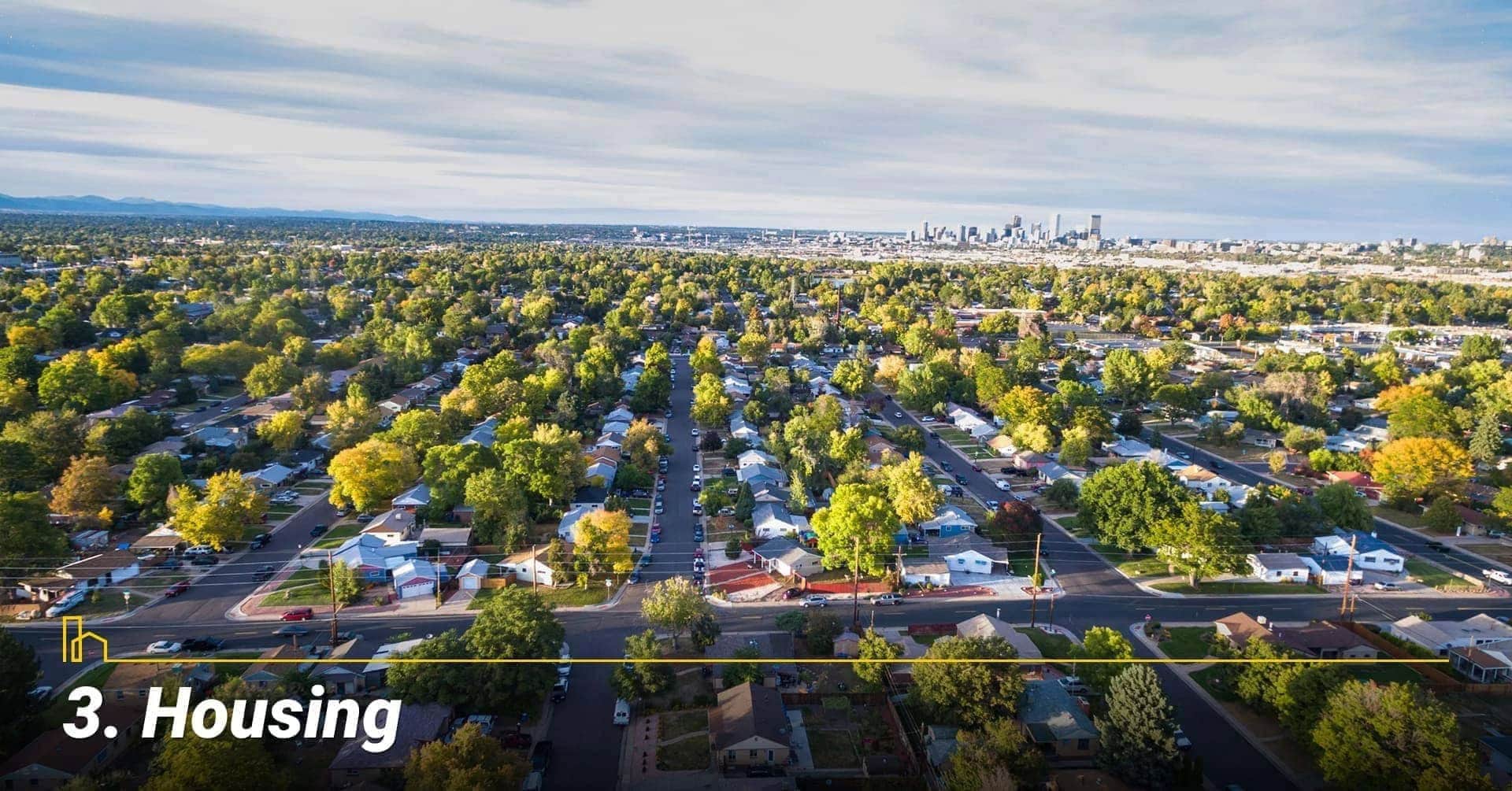
Denver’s housing market has been on a steady rise, fueled by the city’s growing population and its appeal as a place to live and work. Home prices have climbed higher than the national average, but for many, investing in Denver real estate is worthwhile.
In 2010, the median home price in the Denver metro area was just under $200,000. By 2023, this figure had jumped to $540,400. For buyers, this translates to a monthly mortgage payment of around $2,200. At the same time, Denver’s rental market remains robust, with median rents hovering around $1,400. As the city expands, both buying and renting present viable options depending on personal goals and financial plans.
Denver’s neighborhoods offer a range of options for homebuyers and renters alike. For those looking to buy affordably, neighborhoods like Barnum, Valverde, and Ruby Hill feature modestly-priced homes. Barnum, known for its historic charm, offers a tight-knit feel with access to parks and trails, while Valverde’s proximity to downtown makes it ideal for those seeking a shorter commute. Ruby Hill, famous for its park and outdoor amphitheater, combines affordable housing with recreational opportunities.
Renters will also find opportunities in these areas, with a variety of homes and smaller apartment complexes. In particular, Ruby Hill has seen a growth in new apartment buildings, providing updated options for those not yet ready to purchase a home.
Neighborhoods like Sunnyside, Regis, and Harvey Park are moving up the price scale and offering mid-range housing for buyers and renters. Sunnyside’s mix of renovated historic homes and new builds has made it a favorite for those looking to be near downtown without the premium price tag. Regis, with its university influence, offers a quieter, more residential feel, while Harvey Park is known for its mid-century modern homes, which attract buyers and renters who appreciate unique architecture and larger lots.
Pros and Cons of Living in Wyoming
Choosing to relocate can be quite overwhelming. Once you decide on a state, you still need to choose the right community. If you’ve decided to make Wyoming your new home, you’re in luck — it’s a big and varied place with something for all ages, family dynamics and budgets…
In these neighborhoods, renters can find a mix of single-family homes and newer apartment complexes, especially in Sunnyside, where the influx of development has created a more competitive rental market. Regis offers plenty of rental homes and apartments that cater to students and professionals. In contrast Harvey Park’s rental market remains quieter, focusing on houses rather than large apartment complexes.
For those with higher budgets, neighborhoods like Cherry Creek, Hilltop, and Belcaro are known for their upscale properties. Cherry Creek offers modern, luxury condos and townhomes near its premier shopping district. At the same time, Hilltop features spacious historic homes on tree-lined streets. Belcaro, one of Denver’s most exclusive neighborhoods, boasts expansive properties and a peaceful, residential feel.
Even in these more affluent areas, renters can find high-end apartments and homes for lease. Cherry Creek, in particular, is known for luxury apartment buildings that offer amenities like rooftop pools and concierge services, catering to those who seek an elevated urban lifestyle without the commitment of homeownership.
For those who want to live in the heart of the city, downtown neighborhoods like LoDo and RiNo offer a dynamic urban experience. LoDo’s historic lofts and luxury high-rises blend old and new, appealing to buyers who want proximity to Denver’s best restaurants and cultural attractions. RiNo, with its vibrant arts scene and industrial-chic aesthetic, is a hotspot for younger professionals and creative types.
As Denver continues to grow, its housing and rental markets remain diverse, catering to a wide range of preferences and budgets. Whether you’re looking to buy your forever home or secure a rental in one of the city’s dynamic neighborhoods, Denver’s options are as varied as its residents.
The Pros and Cons of Moving to Arizona
If you are considering moving to Arizona, you’re in the right place! Known for its stunning desert landscapes, vibrant cities, and warm climate, Arizona offers a fantastic environment for living, working, and raising a family. State 48 has a diverse range of outdoor activities, from hiking in the Grand Canyon to exploring the red rocks of Sedona…
4. Safety and Healthcare: Living Well in a City Focused on Well-Being

Denver’s safety and healthcare landscape reflects the growing pains of a major city and its concerted efforts to address these challenges. While the city’s violent crime rate stands at 10.58 per 1,000 residents, slightly above state and national averages, many of Denver’s neighborhoods maintain a strong sense of community and relative safety. Areas like Washington Park, Central Park, and Cherry Creek have low crime rates, making them desirable locations for families and professionals. Even in neighborhoods where crime is more prevalent, such as Capitol Hill or along the Colfax corridor, community policing efforts and local programs are making strides in fostering safer environments.
On the healthcare front, Denver shines as a regional leader, offering world-class services across several prominent healthcare systems. Facilities like UCHealth Anschutz Medical Campus and National Jewish Health are recognized nationwide for their specialties, particularly in trauma care and respiratory medicine, respectively. As a public hospital, Denver Health, plays a crucial role in providing care to underserved populations, ensuring that even residents without comprehensive insurance have access to quality care. This combination of public and private healthcare institutions makes Denver one of the most medically equipped cities in the region.
Residents across the city have a wide variety of healthcare options, from neighborhood clinics to specialized care centers, allowing for flexibility depending on their needs. The city’s healthcare network extends into vulnerable areas through mobile health units and expanding neighborhood clinics, ensuring that residents of underserved communities, like Montbello and Elyria-Swansea, have better access to healthcare services. Although these areas may experience challenges such as longer wait times, initiatives to improve healthcare access are starting to make a positive impact.
The Pros and Cons of Living in New Mexico
New Mexico is more than deserts and adobe—it’s a land of deep culture, creativity, and laid-back living. However, challenges like limited job opportunities, high crime, and underfunded schools exist. This guide explores New Mexico’s pros and cons, plus its best cities for professionals, families, and retirees seeking Southwestern charm.
Public safety and healthcare intersect in meaningful ways across Denver. Programs such as the STAR initiative, which deploys mental health professionals rather than police officers to respond to non-violent emergencies, are providing more targeted, compassionate responses to situations involving mental health crises or homelessness. This helps alleviate the burden on emergency rooms and law enforcement, creating a system that simultaneously prioritizes mental health care and safety. These proactive approaches contribute to the city’s broader efforts to reduce both crime and health-related emergencies.
Denver’s commitment to public health is further reinforced by its growing focus on mental health and substance abuse treatment. Major healthcare providers like Kaiser Permanente are integral to public health initiatives, working to provide preventive care and address issues such as the opioid crisis. Nonprofits and government agencies also play a role in this space, focusing on making healthcare affordable and accessible for the city’s lower-income residents. This broad-based approach ensures that healthcare in Denver is responsive to the needs of all its residents.
Ultimately, Denver’s efforts to improve both safety and healthcare positively impact on the quality of life for its residents. While challenges remain, particularly in high-crime areas or among vulnerable populations, the city’s investments in innovative healthcare solutions and community safety programs indicate a forward-looking approach. As Denver continues to grow, these initiatives are positioning the city as a place where healthcare is accessible, and communities are empowered to become safer and healthier.
Recommended for you
5. Employment in Denver: Career Growth in a Booming Economy

Denver’s diverse employment market reflects the city’s steady growth and economic expansion. With an unemployment rate of 4% as of June 2023, Denver is slightly better than the national average of 4.10%, indicating a stable job market with opportunities across several sectors. The city’s population growth has increased the demand for jobs while attracting major companies and fostering the development of new industries. Denver’s strategic location and reputation as a central metropolitan area in the Mountain West region have made it a magnet for national and global businesses looking to tap into the city’s talent pool.
Key industries driving employment in Denver include aerospace, telecommunications, financial services, and tech startups. Companies like Lockheed Martin, a leading aerospace and defense contractor, play a crucial role in the region’s economy, particularly in engineering and technical fields. Additionally, Dish Network, headquartered in the Denver metro area, is one of the top employers in telecommunications, with thousands of employees working in customer service, corporate management, and technology. These industries offer opportunities for workers with a variety of skills, from entry-level positions to highly specialized roles in engineering and research.
15 Best Places to Live in Oklahoma
Are you planning to relocate to Oklahoma? Whether you are drawn to the cosmopolitan vibes of the cities or the tranquility of rural life, we curated a list of 15 of the best communities to live in Oklahoma for those considering making the Sooner State their new home…
The city has a strong financial services sector, with Charles Schwab and Western Union headquartered in the region. These companies provide significant employment opportunities, particularly in corporate finance, investment management, and technology support roles. Additionally, Denver’s startup scene, particularly in the tech industry, has drawn attention from venture capitalists and investors. Startups in Denver, such as Guild Education and Ibotta, are scaling rapidly, offering roles in software development, marketing, operations, and human resources. This growth has cemented Denver’s status as a city where innovation increasingly becomes a hallmark of its employment landscape.
For those commuting in the city, the average travel time to work is 25.3 minutes, offering a manageable daily commute compared to larger cities. Denver’s job market, with its relatively low commute time and livable wages, makes it an attractive place for job seekers across various industries. However, as more businesses set up operations and population growth continues, competition for some of the more desirable positions has increased, making professional development and education key components for securing long-term employment in the city.
6. Education: Shaping the Future

Denver’s education system reflects a strong commitment to foundational learning, with 90.5% of its residents holding a high school diploma or higher, surpassing the national average of 89.1%. Denver Public Schools (DPS), the largest district in the city, plays a central role in providing education to over 90,000 students in more than 200 schools. However, the quality and performance of schools can vary significantly by neighborhood. Affluent areas such as Washington Park and Central Park often enjoy better funding, which correlates with higher test scores and graduation rates. In contrast, schools in lower-income areas like Montbello face more challenges, including limited resources and lower overall performance.
To address these challenges, DPS has implemented targeted programs to close the achievement gap, especially in underserved areas. The Denver Plan 2020 aimed to improve literacy rates, enhance college and career readiness, and ensure equity across all schools. Additionally, the district has expanded its school choice programs and charter schools, providing families with alternative education options that cater to specific student needs. These schools focus on a range of curriculums, including STEM, arts, and dual-language immersion, allowing students to find tailored educational pathways that help bridge performance gaps seen in the traditional public school system.
Cost-Conscious Living in Utah: A Guide to the State’s Cheapest Cities
Each city holds unique surprises and perks for residents looking to make a savvy, budget-conscious move. So, let’s dive into these budget-friendly gems and see why they’re considered the best-kept secrets of Utah!…
Denver also boasts an impressive higher education attainment rate, with 54.2% of residents holding a bachelor’s degree or higher, far exceeding the national average of 34.3%. This is supported by institutions like the University of Denver, Metropolitan State University of Denver, and the University of Colorado Denver, which offer a broad spectrum of undergraduate and graduate programs. These universities partner with local businesses and industries to create strong educational and employment pipelines, especially in high-demand fields like business, technology, and healthcare. The collaboration between these higher education institutions and Denver’s booming economy positions students for success in the workforce.
Denver’s educational ecosystem is further strengthened by its commitment to offering diverse educational models that meet the needs of a varied population. Beyond charter schools, DPS continues exploring innovative programs that address specific community needs. By fostering a culture of educational equity and opportunity, Denver ensures its students are prepared for college and equipped with the skills necessary to succeed in the city’s competitive job market. This holistic approach to education—from early childhood through higher education—helps maintain Denver’s status as a city that values learning, growth, and opportunity for all its residents.
11 Key Factors to Know About Living in New Mexico
Is New Mexico right for you? Here is a comprehensive guide to life in the Southwest. Located in the southwestern part of the United States, and nestled between Arizona and Texas, New Mexico has a blend of history, culture and natural landscapes that have earned it the nickname “The Land of Enchantment.”
7. Climate in Denver: Sunshine, Snowfall, and Mile-High Skies
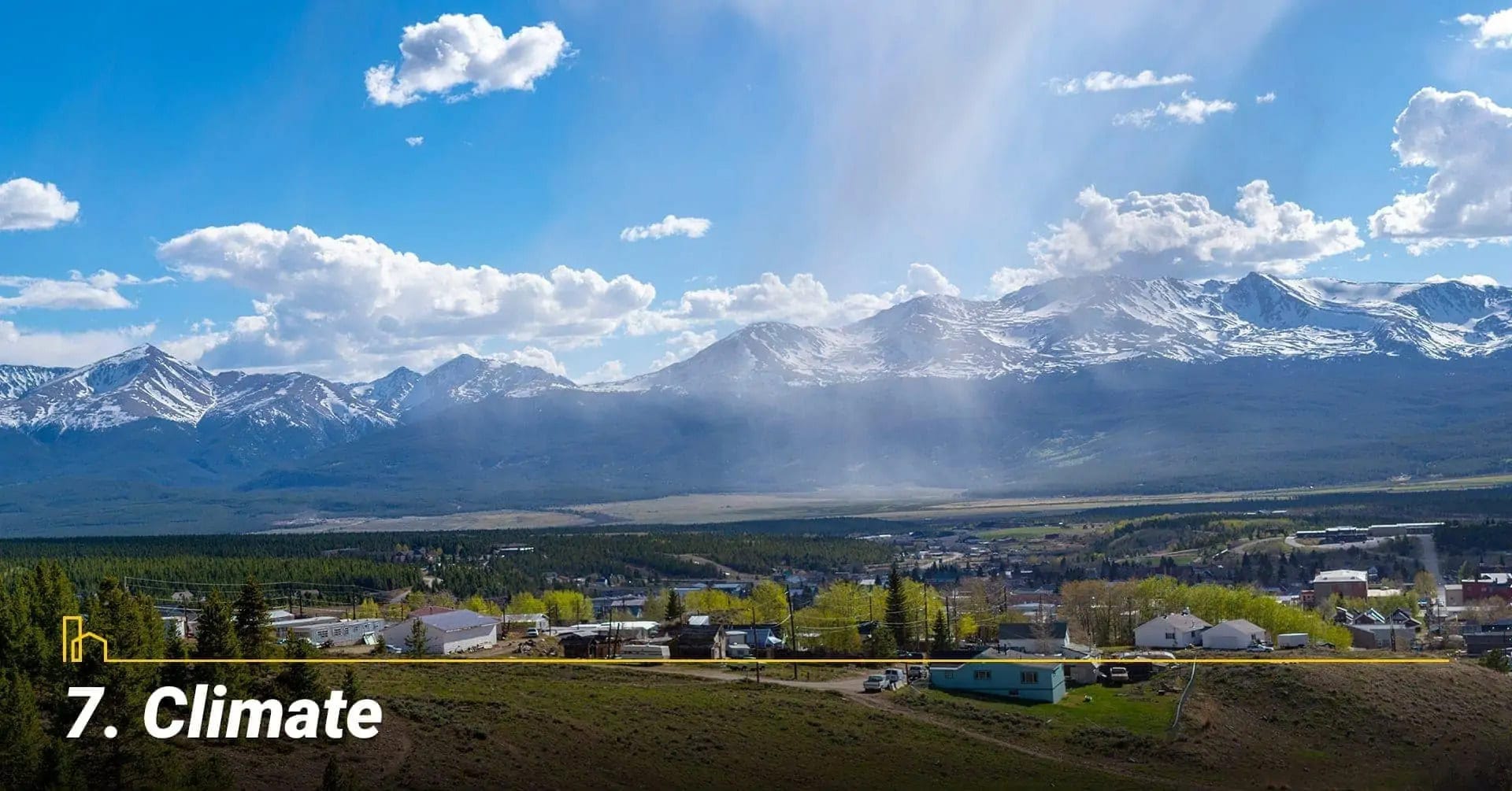
Denver’s climate is defined by its high altitude, semi-arid environment, and plentiful sunshine. Sitting at an elevation of 5,280 feet—earning its nickname as the “Mile High City”—Denver experiences significant weather patterns influenced by its elevation. The city boasts an impressive 300 days of sunshine annually, making it one of the sunniest cities in the United States. Despite its reputation for snow, the dry air and abundant sunshine mean snowfall often melts quickly, even during winter. Snowstorms can drop several inches of snow overnight, only to begin melting by midday. The fast snowmelt is due to Denver’s intense sunshine, even in winter, with temperatures frequently rising into the 40s and 50s after a storm, leading to dry streets within a day or two.
One of the challenges unique to Denver is its high-altitude environment, which requires visitors and new residents to acclimate. The thinner air at this altitude contains 17% less oxygen than at sea level, which can lead to symptoms like shortness of breath, dehydration, and altitude sickness, especially during physical activity. Hydration is key when adjusting to Denver’s altitude, as the dry air causes moisture to evaporate more quickly from the skin and lungs. It can take anywhere from a few days to a few weeks to fully adjust to the altitude, especially for those who engage in outdoor activities like hiking or skiing. This acclimation process is critical for health, as failure to adapt can lead to headaches, fatigue, and dizziness.
Denver’s dry climate also contributes to red flag days, which are declared when high winds, low humidity, and dry conditions increase the risk of wildfires. These conditions occur frequently during late spring and summer, and red flag warnings are common in and around Denver. The low humidity levels, often below 20%, can lead to dry skin and respiratory issues, particularly for individuals with preexisting conditions like asthma. The combination of frequent sunshine and dry, windy conditions during these red flag days not only heightens the wildfire risk but can also cause poor air quality, exacerbating health concerns for those with respiratory issues.
6 Best Affordable Places to Live in Utah
The state is well-known for its outdoor recreation. From hiking in the red rocks of Southern Utah and snow skiing in Park City to ice fishing at one of the numerous lakes, it’s no surprise that Utah comes in as one of the best states for outdoor activities…
Summing it Up with Something for Everyone
In conclusion, Denver presents a lifestyle that seamlessly integrates urban living with outdoor accessibility, making it a highly desirable place for many to call home. The city’s extensive park system and proximity to the mountains offer an unmatched balance for those who crave city life and the natural world. Its strong economy continues to attract people from across the country, but the growing population also brings challenges, particularly with rising housing costs. Nonetheless, Denver’s mix of historic charm and modern amenities provides plenty of options for those looking to establish roots in the city.
Each neighborhood in Denver has its own distinct character, offering diverse living experiences. Whether you prefer the artsy vibe of RiNo or the historic atmosphere of Capitol Hill, there’s a place for everyone. The continued investment in infrastructure, such as public transportation and local markets, allows residents to enjoy convenient, accessible living without sacrificing community spirit. This sense of local connection is a hallmark of life in Denver, with numerous community events, farmer’s markets, and outdoor festivals bringing neighbors together throughout the year.
Ultimately, for those considering making Denver their home, the city’s blend of outdoor recreation, cultural richness, and economic opportunity are key factors to weigh. While the city faces challenges like the increasing cost of living and the effects of a rapidly growing population, Denver’s appeal lies in its ability to offer residents a high quality of life in a setting where work, play, and community coexist effortlessly. With its year-round sunshine and a strong sense of place, Denver continues to stand out as a vibrant yet comfortable place to live.
FAQs about Living in Denver, Colorado
Living in Denver raises deeper questions than, “Is it nice?”People want clarity on cost, lifestyle, health, and long-term fit extending beyond the core article’s neighborhood and lifestyle overview.
1. How expensive is it to live in Denver?
Denver’s overall cost of living is several percentage points above the Colorado and U.S. averages, with housing about 20%–22% higher than the national benchmark.
Average rents sit around the high-$1,800s to low-$1,900s for apartments, while median home values fall in the mid-$600,000s, making careful housing budgeting essential for newcomers.
2. What kinds of people tend to thrive in Denver?
Mile-High works particularly well for professionals valuing reliable job markets and convenient access to hiking, skiing, and outdoor recreation.
Active families and remote workers who are outdoor junkies, socially engaged lifestyles often report the best fit, while those seeking basement-level costs or ultra-dense, coastal-style urban living may feel mismatched.
3. How challenging is Denver’s altitude for new residents?
At roughly 5,280 feet, this elevation can cause headaches, dehydration, and shortness of breath during the first days or weeks, especially for those with heart or lung conditions.
Newcomers can adapt by hydrating heavily, moderating alcohol intake, and easing into intense exercise, but people with significant medical issues should consult a doctor before relocating.
4. What is daily weather really like?
Here delivers around 300 days of sunshine per year, with plenty of mild, blue-sky winter days despite periodic snowstorms.
Locals must be comfortable with rapid weather swings—temperatures can shift dramatically within 24 hours, and occasional snow, hail, or spring storms can surprise those used to more stable climates.
5. How bad are traffic and commuting?
Rush-hour traffic on key corridors and limited light-rail coverage mean many residents still rely on cars and face extended commute times.
Central neighborhoods including LoDo, Baker, and Capitol Hill provide walkability and transit access, but they also tend to come with higher housing costs and tighter parking.
6. Is Denver still a good value compared with other major cities?
While no longer the “cheap” Rocky Mountain secret, the capital remains more affordable than high-cost tech hubs such as San Francisco or Seattle, particularly on rent for comparable apartments.
Those calling it home believe generous salaries, outdoor access, and quality of life justify the higher local prices, provided they plan housing and transportation costs carefully.
7. How should someone decide if Denver is the right fit?
Prospective movers should weigh four core factors: cost of living, career opportunities, tolerance for altitude and weather swings, and desire for an outdoor-driven lifestyle.
If high housing costs and traffic are acceptable tradeoffs for sunshine, mountain access, and a dynamic economy, DEN is the correct long-term choice.
Table of Contents:
- HOMEiA Score: Our Methodology
- 1. Lifestyle of Denver: Urban Convenience with Outdoor Adventure
- 2. Cost of Living: Navigating Expenses Among Rising Popularity
- 3. Denver Housing Market: Opportunities in a Rising Market
- 4. Safety and Healthcare: Living Well in a City Focused on Well-Being
- 5. Employment in Denver: Career Growth in a Booming Economy
- 6. Education: Shaping the Future
- 7. Climate in Denver: Sunshine, Snowfall, and Mile-High Skies
- Summing it Up with Something for Everyone
- FAQs about Living in Denver, Colorado
HOMEiA is a city guide site where visitors can find detailed information about communities of interest. HOMEiA’s City Guides, created in partnership with local writers and editors, are curated lists of the best, safest, and most affordable places to live. The guides feature the HOMEiA Score, a proprietary index that rates communities on such factors as housing costs, education, employment, etc.
HOMEiA.com aims to be the premier site for people planning to relocate, providing them with insightful content and connecting them with skilled real estate professionals.
We also empower real estate professionals to establish or strengthen their web presence by highlighting their experience, knowledge and achievements. If you’re selected to join our list of certified real estate professionals, you will distinguish yourself from your peers — and earn HOMEiA’s support.
If you believe in HOMEiA’s mission, please share our website with others.
Table of Contents:
- HOMEiA Score: Our Methodology
- 1. Lifestyle of Denver: Urban Convenience with Outdoor Adventure
- 2. Cost of Living: Navigating Expenses Among Rising Popularity
- 3. Denver Housing Market: Opportunities in a Rising Market
- 4. Safety and Healthcare: Living Well in a City Focused on Well-Being
- 5. Employment in Denver: Career Growth in a Booming Economy
- 6. Education: Shaping the Future
- 7. Climate in Denver: Sunshine, Snowfall, and Mile-High Skies
- Summing it Up with Something for Everyone
- FAQs about Living in Denver, Colorado








